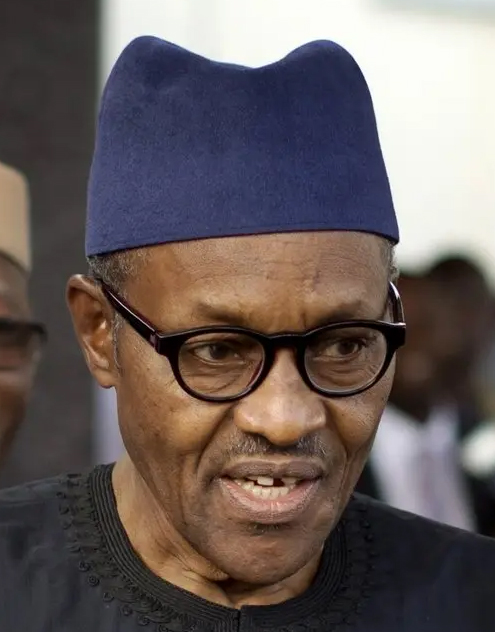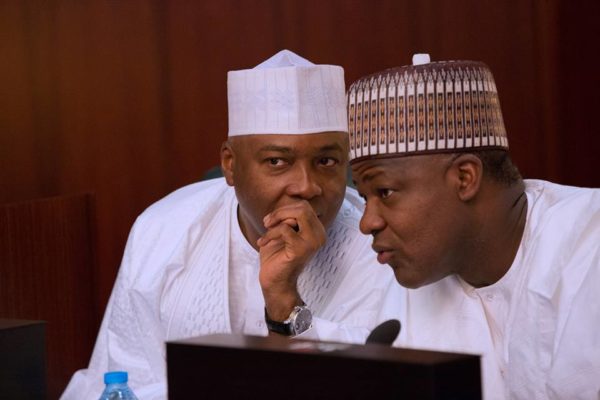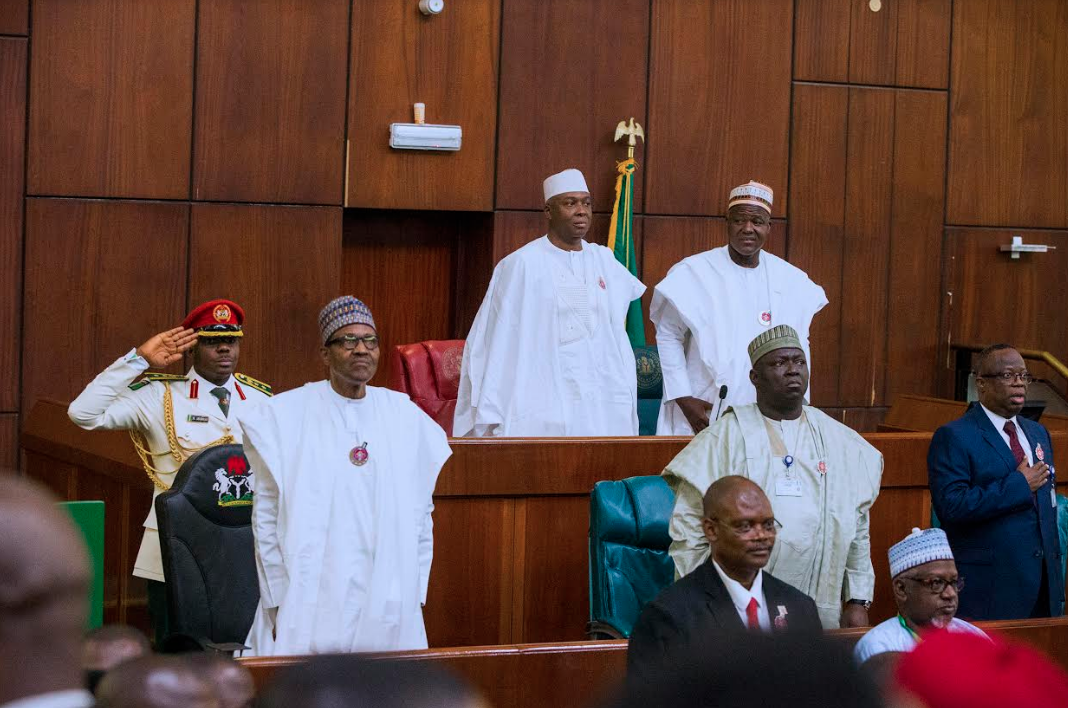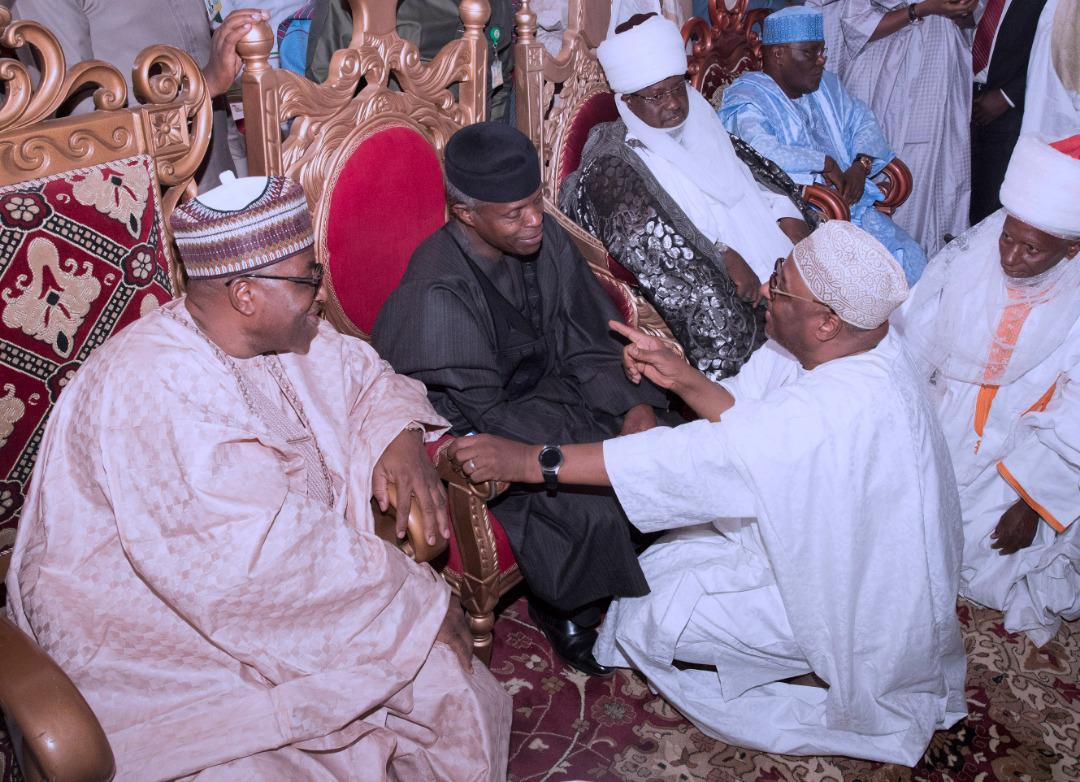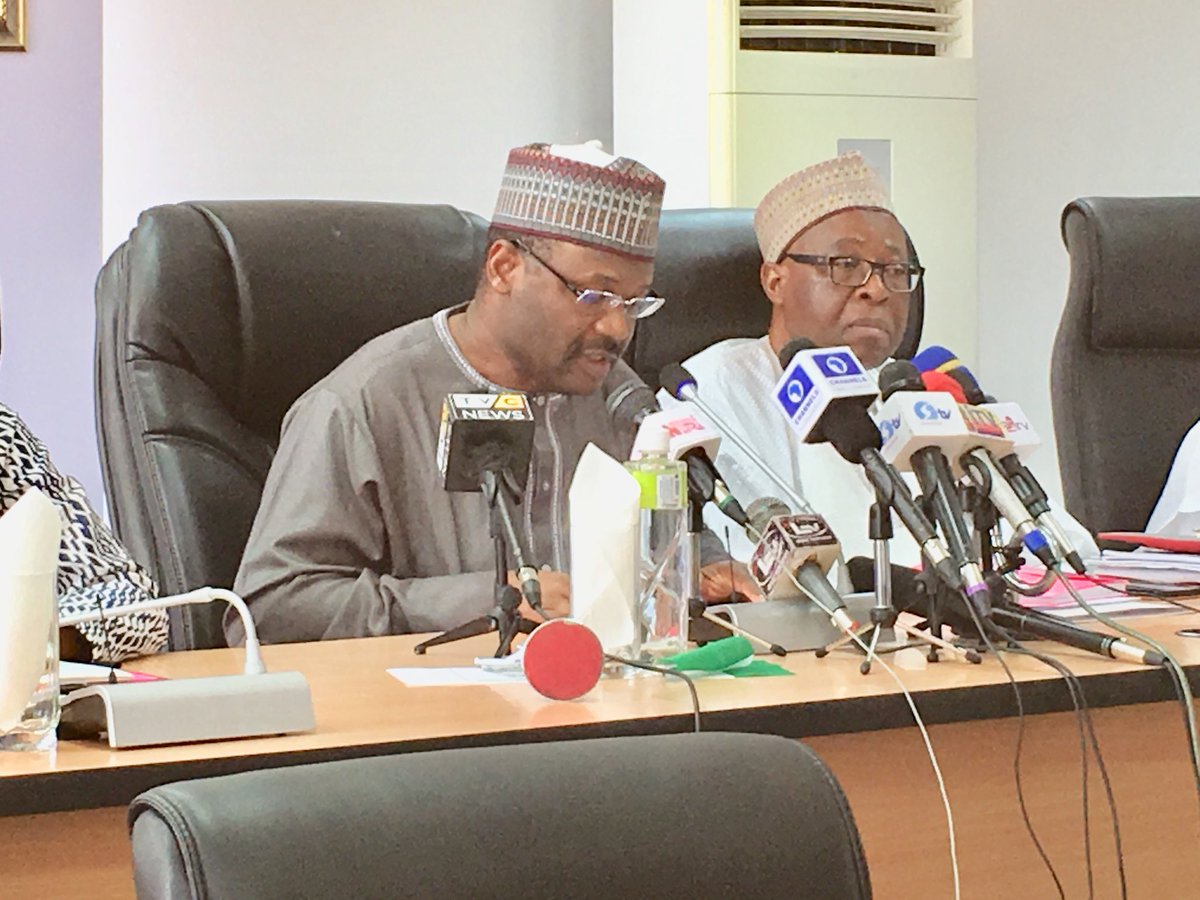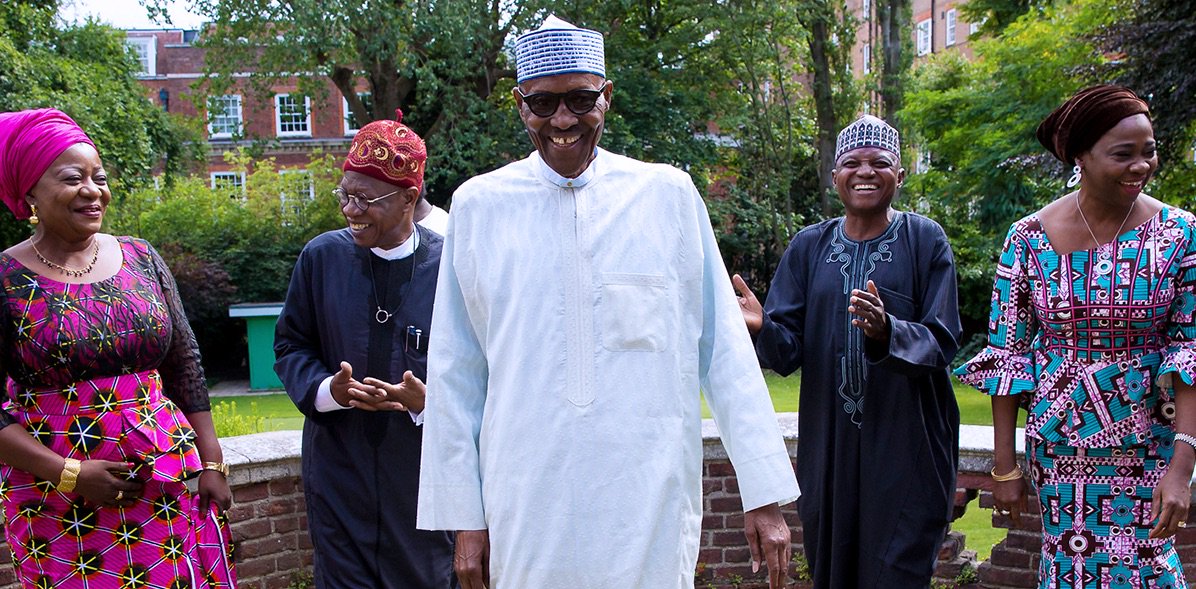It is my pleasure to present the 2019 Budget Proposals to this Joint Session of the National Assembly.
This being my last budget speech to the 8th National Assembly, I will review economic developments over the past three and a half years with particular emphasis on 2018. I will then highlight the budget proposals for 2019. The full details of which will be given by the Honourable Minister of Budget and National Planning.
OVERVIEW OF ECONOMIC DEVELOPMENTS
The last three and a half years have been challenging both at home and abroad. Commodity prices, both oil and non-oil, have been volatile. Global trends, be it security, trade or politics have also been unpredictable. Here in Nigeria, we have had to cope with disruptions in oil production and exports, security challenges and devastating floods.
Advertisement
Through hard work, and by the special grace of God, we have weathered these storms and made progress on many fronts which is why we have cause to be optimistic about the future.
The economy has recovered from recession and we have had six quarters of growth since then.
We have done more work with less resources in agriculture, infrastructure and social investments. We have built better understanding between the Federal Government and the States on non-partisan lines, in particular, intervening several times to support States to meet their obligations including the payment of salaries and pensions.
Advertisement
Sustained development is difficult, if not impossible, in an atmosphere of insecurity and poor governance. We have therefore made strenuous and successful efforts to overcome the insurgency in the North-East and to resolve inter-communal misunderstandings elsewhere.
The Federal government and the National Economic Council have been working in a unified and patriotic manner to tackle the underlying causes of tension between pastoralists and sedentary farmers. These conflicts have a long-standing history caused mainly by competition for increasingly scarce resources occasioned by rising population and erratic weather conditions – a product of climate change.
I take this opportunity to salute the men and women in our Armed Forces and Security Services for their courage, sacrifice and patriotism in protecting our collective safety and security.
The Federal Government has also sustained its efforts to fight grand corruption and improve public financial management, and its efforts to improve public financial management through the comprehensive implementation of the Treasury Single Account, the Government Integrated Financial Management Information System and the Integrated Payroll and Personnel Information System.
Advertisement
You will also recall that as part of our commitment to improved governance, we joined the Open Government Partnership in 2016 with the aim of enhancing public service delivery, promoting business opportunity, enhancing government efficiencies, preventing corruption and building trust in government. We remain committed to these, and other institutional reforms that will enhance transparency and accountability in public service delivery.
We also recorded several successes in economic management. Real Gross Domestic Product growth stood at 1.81 percent in the third quarter of 2018 compared to 1.17 percent in the third quarter of 2017. We have had a sustained accretion to foreign exchange reserves from a low of $28.57 billion in May 2015 to $42.92 billion by mid-December 2018. This has contributed to exchange rate stability and will provide a buffer against any unanticipated external shocks. Inflation has also declined from a peak of 18.72 percent in January 2017 to 11.28 percent in November this year.
In the area of trade, Nigeria has moved from a deficit to surplus in our trade balance. As at the third quarter of 2018, the trade balance was a surplus of N681.27 billion representing a significant improvement from the deficit of N290.1 billion in 2016. This reflects the rebound in crude oil exports, increased non-oil exports and a reduction in the importation of food and items that can be produced locally. Foreign capital inflows including direct and portfolio investments also responded to improved economic management. Capital importation to Nigeria in the third quarter of 2018 stood at $2.86 billion, which is a 56.7 percent increase compared to the corresponding period in 2016.
Trading is a significant contributor to our economic development but we must continue to focus on strengthening actual production. From farmers to miners to processors to digital entrepreneurs to players in the entertainment industry, all hands must be on deck to ensure the country succeeds.
Advertisement
With regard to the oil and gas sector, crude oil production continues to increase steadily towards budgetary targets and will receive a further boost when the 200,000 barrels per day Egina oil field starts operations.
In agriculture, we are seeing increased investment across the entire value chain from agricultural inputs to farming and ultimately, food processing. Barely three years ago, Nigeria was spending $5 million dollars a day on rice importation. Today rice imports have virtually stopped. Indeed, we are on course to achieve food security in major staple foods in the not too distant future
Advertisement
Distinguished Senate President, Right Honourable Speaker
Infrastructure development is also another area in which we have made a lot of progress. Our approach was a logical one. We simply prioritised the completion of critical on-going projects over the introduction of new ones.
Advertisement
For example, in the Ministry of Water Resources, we identified 116 abandoned or uncompleted projects relating to irrigation, dams, drainage and water supply. To date, we have completed and/or commissioned a number of these projects including;
a. Central Ogbia Regional Water Project, Bayelsa State
Advertisement
b. Northern Ishan Regional Water Supply Project, Edo State
c. Sabke Water Supply Project, Katsina State
d. Takum Water Supply Project, Taraba State
e. Ogwashi – Uku Dam, Delta State
f. Shagari Irrigation Project, Sokoto State
g. Galma Dam, Kaduna State.
h. Mangu Water Supply Project, Plateau State
i. Federal University of Agriculture, Makurdi Water Supply Project, Benue State
In the railway sector, we completed and commissioned the Abuja-Kaduna Rail Line and the Abuja Metro-Rail Project. Similarly, the previously abandoned Itakpe-Ajaokuta-Warri Rail Line is undergoing test runs and will soon be commissioned. We are also on track for the Lagos – Kano rail line as significant progress has been made on the Lagos to Ibadan segment of the project.
We remain committed to rebuilding and expanding our road network. In 2018, an additional 1,531 kilometers of roads have been constructed and 1,008 kilometers rehabilitated across the country. Priority projects such as the Abuja – Kaduna – Kano highway as well as the Second Niger Bridge are well underway through the Presidential Infrastructure Development Fund.
In every State of Nigeria today there is a major Federal road project going on. For instance:
a. In the North Central, long neglected roads like the Ilorin-Jebba Road, a stretch of 93 km that took a number of days to travel has been completed to provide a critical link between the North and South of Nigeria over a few hours. We have awarded the dualization of this road to expand it all the way to Mokwa, as we have done to the Abuja – Keffi-Lafia -Makurdi roads where work recently commenced. Similarly, work has resumed on the Suleja – Minna road after years of inactivity.
b. In the South-South, we have recently completed the 60 km section of Alesi to Ugep in Cross River State, and awarded the 72km section from Odukpani Junction to Ugep which will reduce a journey that used to take 3 days a few years back, to 3 hours. Work has also commenced on the Calabar – Itu – Odukpani Road that links Akwa-Ibom to Cross River State, as we have started work on the long-neglected Bodo – Bonny Bridge to connect these long separated communities.
c. In the South East, a critical section of Umunya linking Awka to Onitsha, a stretch of 18 kilometers, is being constructed now and one side of it should be ready for use before June 2019. Roads like Arochukwu – Ohafia – Bende are also receiving our attention.
d. In the South–West, long neglected and abandoned roads like the Badagry Expressway have been awarded for construction along with the Apapa – Tin Can Island, Mile 2 – Oworonshoki, road to ease the congestion currently being experienced in Lagos, while interstate roads linking Ogun through Ikorodu to Sagamu, and Ipaja to Otta and Abeokuta are being repaired with payment to contractors.
e. In the North-West, we have completed the Sokoto to Tambuwal – Jega Road comprising 135 Km out of the entire Sokoto to Yauri stretch and sections of Kaduna Eastern bypass and Kano Western bypass are also progressing.
f. In the North-East, we have started work on the long-neglected Mayo – Belwa – Jada Road, and the Gombe – Numan – Jalingo Road and recently awarded the reconstruction of bridges damaged by insurgency.
In addition, thanks to the N100 billion Sukuk Bond raised in Nigeria, work is on-going in 25 road projects. Among which are:
a. Construction of the Oju/Loko-Oweto bridge over River Benue
b. Dualisation of section of Abuja-Abaji-Lokoja Road
c. Dualisation of section of Suleja-Minna Road
d. Dualisation of section of Lokoja-Benin Road (Obajana – Okene)
e. Dualisation of section of Kano – Maiduguri Road linking Kano-Jigawa-Bauchi-Yobe
f. Dualisation of section of Kano-Katsina Road
g. Dualisation of section of Kano Western By-Pass
h. Construction of Kaduna Eastern By-Pass
i. Rehabilitation of outstanding section of Onitsha-Enugu Expressway
j. Rehabilitation of Enugu-Port Harcourt Road
k. Dualisation of section of Yenegoa Road Junction
In power, we are working on over 90 transmission projects across the country. Major power transmission stations like Mayo Belwa in Adamawa, Ejigbo and Odogunyan in Lagos, Apo in Abuja, Ikot – Ekpene Switching Station Akwa Ibom, Maiduguri in Borno, Damaturu in Yobe have been completed to support electricity transmission.
For effective delivery to critical areas, we decided that we had to decentralize power supply leveraging off-grid solutions especially solar based systems. We are pushing more “willing- buyer willing –seller” arrangements. Already, this has brought more reliable off-grid power to markets and economic clusters around the country.
The projects being implemented right now include the Ariaria Market in Aba, the Sabon Gari Market in Kano, the Sura Shopping Complex in Lagos to mention a few. Our hope is to roll out such programs to 300 such economic clusters across the country.
In addition to economic clusters, we are also looking at rolling out similar off grid solutions to Universities and medical centers across the country.
As we develop our infrastructure and power sector, we have not lost sight of the adverse impact climate change has to our economy, food and national security agenda. The recent floods, farmer-herdsmen conflict and aggressive desertification are all effects of climate change. We have seen our forests, lakes, arable land and grazing areas gradually disappear over the decades.
As a Government, we took a long term view on tackling the effects of climate change which must be contained and ultimately reversed. We have stepped up our afforestation efforts. In the past two years, we have planted over 2.3 million seedlings in 21 States. We also successfully launched the Green Bond which will focus on developing environmentally friendly projects and other green programs across the country. Nigeria is also actively participating in international efforts to tackle climate change.
Furthermore, working with key stakeholders including the National Assembly, State Governments and the private sector, we intensified our drive to remove obstacles, reduce processes and lower costs of doing business. The fact that over the past three years, Nigeria has gained 24 places in the World Bank Ease of Doing Business rankings is a clear indication that we are moving in the right direction.
We are confident that improvements arising from on-going work will result in another quantum leap in the 2019 rankings. The States have also keyed into efforts to improve the business environment, and the sub-national Doing Business Report for Nigeria showed that 32 out of 36 states recorded overall improvement.
In line with our commitment to creating a fairer and more inclusive society, I am pleased to update you on our efforts in this regard. Specifically,
a. Through the N-Power scheme, 500,000 graduates have been employed to date;
b. The National Home-Grown School Feeding program is feeding 9,300,892 pupils in 49, 837 schools in 24 states across Nigeria, and empowering 96,972 cooks;
c. The Government Enterprise and Empowerment Program has seen to the disbursement of 1,378,804 loans to small businesses and farmers in all states including the FCT. These are interest free loans that will be paid back;
d. 297,973 households in 26 states across the country are benefitting from the Conditional Cash Transfer program.
Distinguished Senate President, Right Honourable Speaker
Whilst we are most encouraged by the improved performance of the economy since we started implementing our Economic Recovery and Growth Plan, there is an area that continues to be a cause of concern. That has to do with our unsatisfactory revenue performance.
Although we have sustained efforts at boosting tax revenues, our progress has been constrained by the relatively low level of growth, having just emerged from recession. This has restrained our tax revenue drive.
Furthermore, the volatility in oil prices, and disruptions in oil production, delayed our plans to recover past due oil license and royalty charges as well as restructuring of the Joint Venture Oil Assets.
As we have returned to the path of growth, I have directed that action on all our revenue initiatives be expedited. I have already issued a number of Presidential directives on the disposal of recovered assets, deployment of the National Trade Window as well as the immediate recovery of past-due oil royalties including by crude seizures, if necessary.
On asset recovery, in order to put to use for the benefit of all Nigerians monies and assets stolen from the public treasury, we have since the 2016 Budget created a revenue line in the budget for stolen and recovered funds.
Thus every government project today benefits in one way or the other from recovered looted funds. I have also directed all the relevant authorities to liquidate all recovered, unencumbered assets, such as landed properties, buildings and vehicles, so that these funds can be available to help in the funding of the Budget, particularly the important infrastructure projects.
2018 BUDGET PERFORMANCE
Now to the 2018 Budget performance. The 2018 Budget was based on a benchmark oil price of $51/b, oil production of 2.3 million barrels per day and an exchange rate of N305 to the dollar. Based on these, the Federal Government’s aggregate revenue of N7.17 trillion was projected to contribute to the 2018 Budget of N9.12 trillion. The projected deficit of N1.95 trillion (or 1.73 percent of GDP) was to be financed mainly by borrowing.
In 2018, average oil production up to end of the third quarter was 1.95 mbpd, as against the estimated 2.3 mbpd for the entire year. However, average market price of Bonny Light crude oil was higher (an average of $74 per barrel as at October) than the benchmark price of $51.
As at the end of the third quarter, Federal Government’s actual aggregate revenue was N2.84 trillion, which is 40 percent higher than 2017 revenue. The overall revenue performance is only 53 percent of the target in the 2018 Budget largely because some one-off items are yet to be actualized. We have now rolled this revenue item over to 2019.
Of the total appropriation of N9.12 trillion, N4.59 trillion had been spent by 30th September, 2018 against the prorated expenditure target of N6.84 trillion. This represents 67 percent performance. Debt service and the implementation of non-debt recurrent expenditure, notably payment of workers’ salaries and pensions are on track. Despite the delay in the passage of the 2018 Budget on 20th June 2018, the sum of N820.57 billion had been released for capital projects as at 14th December, 2018. We have carried over capital projects that were not likely to be fully funded by year-end 2018 to the 2019 Budget.
PRIORITIES FOR THE 2019 BUDGET
The 2019 Budget Proposal is intended to further place the economy on the path of inclusive, diversified and sustainable growth in order to continue to lift significant numbers of our citizens out of poverty. The underlying drivers of the 2019 revenue projections have been adjusted to reflect current realities. On the expenditure side, allocations to Ministries, Departments and Agencies of Government were guided by the 3 objectives of the ERGP, which are, (i) Restoring and Sustaining Growth; (ii) Investing in our People and (iii) Building a Globally Competitive Economy.
2019 KEY BUDGET ASSUMPTIONS
The 2019 Budget proposal is based on the following assumptions:
a. Oil price benchmark of $60 per barrel;
b. Oil production estimate of 2.3 million barrels per day, including condensates;
c. Exchange rate of N305/$;
d. Real GDP growth of 3.01 percent; and
e. Inflation Rate of 9.98 percent.
Notwithstanding the recent softening in international oil prices, the considered view of most reputable analysts is that the downward trend in oil prices in recent months is not necessarily reflective of the outlook for 2019. However, as a responsible Administration, we will continue to monitor the situation and will respond to any changes in the international oil price outlook for 2019.
With regard to oil production, I have directed the NPPC to take all possible measures to achieve the targeted oil production of 2.3 million barrels per day.
FEDERAL GOVERNMENT REVENUE ESTIMATES
Total revenue is projected at N6.97 trillion (which is 3 percent lower than the 2018 estimate of N7.17 trillion), consisting of Oil revenue projected at N3.73 trillion while non-oil revenue is estimated at N1.39 trillion.
We have allowed for N305 billion ($1 billion) for under-recovery by NNPC on PMS in 2019. We will continue working to bring it downwards so that such resources are freed up to meet the developmental needs of our people.
Let me also take this opportunity to address and clarify the under-recoveries or subsidy on petrol. In a period of economic challenges where purchasing power is weak, we must reduce some of the burden on Nigerians.
The problem with subsidies in the past is abuse and corruption. Today the government through the NNPC is the sole importer of PMS and therefore, the under-recovery is from the NNPCs trading account. This means the possibility of some marketers falsifying claims is removed.
The estimate for non-oil revenue consists of N799.52 billion from Companies Income Tax (CIT), N229.34 billion from Value Added Tax (VAT) and Customs Duties of N302.55 billion. We have reduced our expectation from Independent Revenues to N624.58 billion. Other revenues expected in 2019 include various recoveries of N203.38 billion, N710 billion as proceeds from the restructuring of government’s equity in Joint Ventures and other sundry incomes of N104.11 billion.
PROPOSED EXPENDITURE FOR 2019
A total expenditure of N8.83 trillion is estimated for 2019. This includes grants and donor funds of N209.92 billion. This provision is less than the 2018 FGN appropriated expenditure estimate of N9.12 trillion. However, it is higher than the N8.6 trillion originally proposed by the Executive Branch to the National Assembly for 2018.
The budget deficit is projected to decrease to N1.86 trillion (or 1.3 percent of GDP) in 2019 from N1.95 trillion projected for 2018. This reduction is in line with our plans to progressively reduce deficit and borrowings.
The proposed N8.83 trillion of 2019 Aggregate Expenditure comprises:
a. Recurrent Costs of N4.04 trillion;
b. Debt Service of N2.14 trillion;
c. Statutory Transfers of about N492.36 billion;
d. Sinking Fund of N120 billion which will be used to retire maturing bond to local contractors; and
e. Capital Expenditure of N2.031 trillion including capital supplementation but excluding the capital component of Statutory Transfers.
STATUTORY TRANSFERS
The provision for Statutory Transfers in 2019 is N492.36 billion which is a seven percent decrease from 2018. However, transfers to Niger Delta Development Commission (NDDC) and Universal Basic Education Commission (UBEC) are projected to be higher as they are directly related to the quantum of oil revenue.
DEBT MANAGEMENT
The sum of N2.14 trillion has been provided for debt service. Of this amount, 80 percent is to service domestic debt which accounts for about 70 percent of the total debt. Although our national debt is within sustainable limits, we need to increase our domestic resource mobilization to bring down our debt-revenue ratio over the medium term.
RECURRENT EXPENDITURE
A substantial part of the recurrent cost proposal for 2019 is for the payment of salaries and overheads in Ministries providing critical public services such as:
a. N569.07 billion for the Ministry of Interior;
b. N435.62 billion for the Ministry of Defence;
c. N462.24 billion for the Ministry of Education; and
d. N315.62 billion for the Ministry of Health.
The allocation to these Ministries represent significant increases over votes in previous budgets, underscoring our commitment to increase investment in national security and human capital development.
PERSONNEL COSTS
Personnel costs, estimated at N2.29 trillion, currently amount to nearly 40 percent of projected revenues. Substantial savings have been made from wider use of the Integrated Personnel Payroll Information System platform. I have directed that all MDAs must implement the IPPIS by March, 2019. We have made provisions for staff promotion arrears and recruitments by the armed forces, police and para-military agencies.
We have also provided for the settlement of inherited outstanding pension liabilities. Again we have included provisions for the implementation of a new national minimum wage.
Furthermore, 1 percent of the Consolidated Revenue Fund amounting to N51.22 billion has been earmarked for the Basic Health Care Provision Fund, and other related commitments.
Let me say something about the minimum wage issue. I am committed to addressing the issue of a new minimum wage and I will be sending a bill to the National Assembly on this. However, in order to avoid a fiscal crisis for the Federal Government, as well as the States, it is important to devise ways to ensure that its implementation does not lead to an increase in the level of borrowing.
I am accordingly setting up a High Powered Technical Committee to advise on ways of funding an increase in the minimum wage, and the attendant wage adjustments, without having to resort to additional borrowings.
The work of this Technical Committee will be the basis of a Finance Bill which will be submitted to the National Assembly, alongside the Minimum Wage Bill. In addition, the Technical Committee will recommend modalities for the implementation of the new minimum wage in such a manner as to minimize its inflationary impact, as well as ensure that its introduction does not lead to job losses.
CAPITAL EXPENDITURE
We have allocated N2.28 trillion for capital spending, inclusive of capital in statutory transfers.
For comprehensiveness and transparency, the expenditure plans of the larger Government Owned Enterprises (GOEs) as well as Multi-lateral and Bi-lateral project-tied loans have been integrated into the 2019 -to- 2021 Medium Term Fiscal Framework.
With the inclusion of N275.88 billion representing capital for the larger GOEs and N556.02 billion for Multi-lateral/Bi-lateral project-tied loans, the aggregate capital budget is N3.12 trillion. This represents 30 percent of the total FGN proposed expenditure for 2019.
In order to get full value for monies expended by the Government over time and to avoid duplication and waste, our emphasis will continue to be on completion of existing projects. Accordingly, provisions have been made to carry over projects that are not likely to be fully funded under the 2018 budget to the 2019 capital budget.
The allocation to the Social Intervention Projects (SIP) has been retained at N500 billion, consisting of N350 billion recurrent and N150 billion capital. This reflects our continued determination to pursue inclusive gender-sensitive and pro-poor growth.
In addition, to maintain the peace in the Niger Delta, the provision of N65 billion for the Presidential Amnesty Programme has been retained in the 2019 budget. Similarly, the sum of N45 billion Naira has been provided for the North East Intervention Fund, as well as the sum of N10 billion Naira as take-off grant for the North East Development Commission.
To further support Small and Medium Scale Enterprises, which are the focus of our industrialisation drive, we have set aside the sum of N15 billion for the recapitalization of the Bank for Agriculture and the Bank of Industry. In addition, the sum of N10 billion is provided as a grant to the Bank of Industry for the purpose of subsidizing the interest rates charged on loans to Small and Medium-Scale Enterprises. This is intended to make it possible for them to access single digit interest rate loans from the Bank of Industry.
OUR VISION FOR THE FUTURE
Our vision is for much better prospects for all Nigerians. With careful economic management and continued diversification of our production and revenue bases, we will build an inclusive and stable economy for generations to come.
In addition to the development of Special Economic Zones which will underpin our efforts to move away from a mono-economy, we intend to exploit the comparative advantages of the six geo-political zones and our 36 states by establishing 6 Industrial Parks and 109 Special Production and Processing Centres across all 109 senatorial zones including shared facilities. These clusters will have power, water, and broadband facilities with embedded regulatory services. The clusters will generate vibrant economic activity, stimulate small businesses and create jobs across the length and breadth of Nigeria.
A key objective going forward is to further encourage and enable ‘prosperous small businesses’. Our micro, small and medium enterprises will accordingly benefit from improved access to funding, supporting infrastructure and off-take arrangements by Government and larger enterprises. They will leverage the Government Enterprise and Empowerment Programme, and the Anchor Borrowers Programme.
Nigeria cannot afford to be left behind in the digital age. To create jobs for our young people, we will build a digital economy around the technology and creative sectors. In partnership with the states and the private sector, we are working on a project to increase broadband penetration across all geopolitical zones of the country, such that over the next four years, all the 774 LGAs will be provided with fibre connectivity.
Modern, up-to-date infrastructure is particularly important to boost economic activity. We will continue with our emphasis on power, roads and rail. In addition to completing the Ibadan-Kano rail line we will also embark upon and move rapidly to complete the Eastern Rail from Port Harcourt to Maiduguri passing through Aba, which will connect to Abakaliki, Awka, Enugu, Owerri, Umuahia, then through Makurdi, Jos, Bauchi and Gombe. The Coastal Rail from Calabar to Lagos will also be completed as we aim to build a true national rail network that links all State capitals. Our road projects will gather pace and priority projects under the Presidential Infrastructure Development Fund such as the Abuja-Kaduna-Kano expressway, the Second Niger Bridge and the Lagos-Ibadan expressway will be fast-tracked for early completion.
We shall expand generation, transmission and distribution of power from the national grid while developing innovative off grid solutions for schools, hospitals and markets.
Efforts to improve hard infrastructure will be complemented by expanding reforms in the ease of doing business initiative. We will continue to remove obstacles, reduce costs and ensure timely delivery of services.
Our social investments and social protection arrangements will continue to be deepened by extending coverage to all States and increasing the number of school children being fed daily. This will come with associated direct and indirect jobs across the value chain including farmers, aggregators, processors, transporters, cooks and servers.
‘Every child counts’! This is the guiding principle of our national educational system and entails far reaching actions to boost digital literacy, impart functional skills to our children, and re-train tens of thousands of teachers every year. Indeed, we must equip our children from a very young age with skills for the modern era by emphasising education in science, technology, engineering, arts and mathematics.
Health is an important part of our aspirations for human capital development and we will continue to strive to make our people healthy and happy. In addition to building world class treatment centres, including for cancer, we will be establishing a health system that prioritises primary health care so that millions of our people can be insured for a minimum package of services with the poorest exempt from co-payments. In so doing, we will reduce the stress, strains and costs that the Nigerian people face in accessing decent health care.
CONCLUSION
This 2019 Budget Proposal, which I lay before you today, has benefited from extensive consultations and stakeholder engagements reflecting our belief that all sectors have a critical role to play in our journey towards sustainable and inclusive development. It further demonstrates our commitments to deliver the dividends of democracy to all Nigerians in a more inclusive manner. It represents another important step in building the Nigeria of our dreams. A vision that we are determined to achieve with the support of all Nigerians.
80. It is therefore with great pleasure and a deep sense of responsibility, that I lay the 2019 Appropriation Bill before this Joint Session of the National Assembly, for consideration and passage. What has become evident over the past three, or so, years is that more can be achieved in the overall interest of the Nigerian people when we work together. It is my hope that despite our current preoccupation with political activities, we can all commit to an early passage of this budget in the larger interest of our people and the national economy.
I thank you most sincerely for your attention.
God bless the Federal Republic of Nigeria.
Being the speech of President Muhammdu Buhari at the presentation of 2019 budget.
